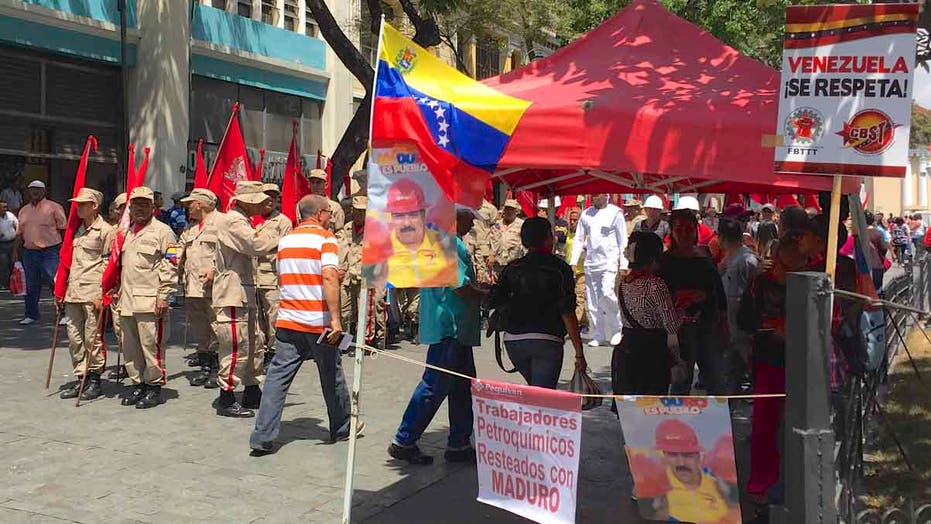Caracas – The new round of sanctions against Venezuela announced by the U.S. a couple of weeks ago targets just seven government officials, but President Nicolas Maduro has called it a “threat” to the nation and is calling for “unity” to defend the country from this “aggression.”
In a massive campaign across the country, he has committed to the goal of gathering 10 million signatures demanding President Barack Obama revoke his March 9 executive order.
The situation is giving some oxygen to Maduro’s administration, whose approval ratings in February were around 20 percent, amid an economic crisis that has brought widespread shortages and an inflation rate (68.5 percent) that ranks among the highest in the world.
Dozens of plazas in Caracas and elsewhere have been turned into Chavista bases aimed at reaching the 10 million mark before the Summit of the Americas that will take place on April 10-11 in Panama City.
“I will sign because it is unfair with the Venezuelan people,” said José Jiménez, while standing in line on Caracas’ Bolivar Square. “Obama is a lawyer, but he is ignorant regarding Venezuela,” he added.
- Anti-Maduro Protests In Venezuela
- Despite tensions and confusion, U.S. travelers to Venezuela begin applying for visas
- Miss Universe ‘Gagged In Venezuela’
- In Senate hearing on Venezuela, Sen. Rubio calls for tougher U.S. sanctions
- Thousands Mourn as Hugo Chavez’s Body Travels Through Venezuela
- The revolution will be danced as Venezuela celebrates Hugo Chávez’s life with a ballet
- Ecuador offers to mediate talks between U.S. and Venezuela to resolve diplomatic dispute
- Opinion: Obama’s policy toward Venezuela – The sanctions and the real threats
Bolivar Square is one of 335 such squares around the country named after Simon Bolivar, a military leader who is widely regarded as one of the most influential figures during the emancipation wars against the Spanish rule. Located at the heart of Caracas’ historic center, it serves as headquarters of sorts for the latest Chavista scheme.
“We are going to keep working until April. The president’s plan is to hand all the signatures to Barack Obama on the Summit of the Americas,” said Carlos Arévalo, a member of the PSUV party who was posted under a tent between the Bolivar Square and the National Assembly building.
“We have 15 posts [for signature-gathering] throughout Caracas’ historic center; every hour we have about 300 people signing,” he told Fox News Latino.
Critics say Maduro is using the petition as a ploy to divert attention away from Venezuela’s spiraling economy, which is on the brink of collapse. The government has denied forcing people to sign the petition.
Around 10 people were standing in line at the moment waiting to sign the document, a booklet with portraits of Venezuelans from all over the country and the message: “Venezuela is not a threat. We are hope.”
President Maduro was the first to sign the document on Wednesday night. “Our goal is to get 10 million signatures from Venezuela and from around the world to demand Obama to repeal his executive order now,” he told a crowd.
Since then, Caracas’ Bolivar Square and the others around the country haven’t returned to normal, and an entire operation seems to have been launched to constantly remind Venezuelans of the most recent U.S. “aggression.”
On Friday, construction workers were called to protest “against U.S. imperialism” in a rally that ended not far from the main Bolivar Square, where a stage had been set up for the performance of traditional music bands and political speeches.
Other signature-gathering posts have sound systems playing old speeches of the late President Hugo Chávez calling for national unity. And the so-called militia, a military branch created by the Chavismo that accepts civilians, is grabbing the opportunity and has opened enrollment centers next to a lot of the signing sites.
On Friday, at exactly noon, some members of the militia marched around the historical square carrying national flags — they called it “an exercise.”
The next day, signing posts were set up at the International Book Fair of Venezuela, with loud speakers throughout the place inviting people to sign the petition in one of four spots available.
In one of the stands, children were given crayons and coloring pages with a blank face of Hugo Chavez.
Despite the massive effort, not all Venezuelans are engaged nor convinced that the U.S. has any ill intention. Trying to make his way through a crowded Bolivar Square on Friday was David Acosta, a 19-year-old worker who refuses to sign: “I don’t like politics and I don’t participate in these activities. I am just trying to get to work.”
Others think that Maduro is wasting away valuable public assets with this campaign. “It is an abuse of power. They are using federal employees, institutions and money to mobilize people for political propaganda,” said María Victoria Fermín, a middle class office worker.
Relations between the U.S. and Venezuela have been rapidly deteriorating as Maduro blames U.S. plotting for the host of economic and social woes plaguing the socialist-governed country. He recently accused the U.S. of working with local opposition groups to stage a coup that involved bombing the presidential palace. Washington called the accusation ludicrous.
The two countries have not exchanged ambassadors since 2010, but have continued to exchange diplomatic staff.
The petition to revoke President Obama´s executive order can be signed online as well. The government is also running a campaign on social media and on Twitter they have the hashtag #ObamaRepealtheExecutiveOrder.
The AP contributed to this report.













































